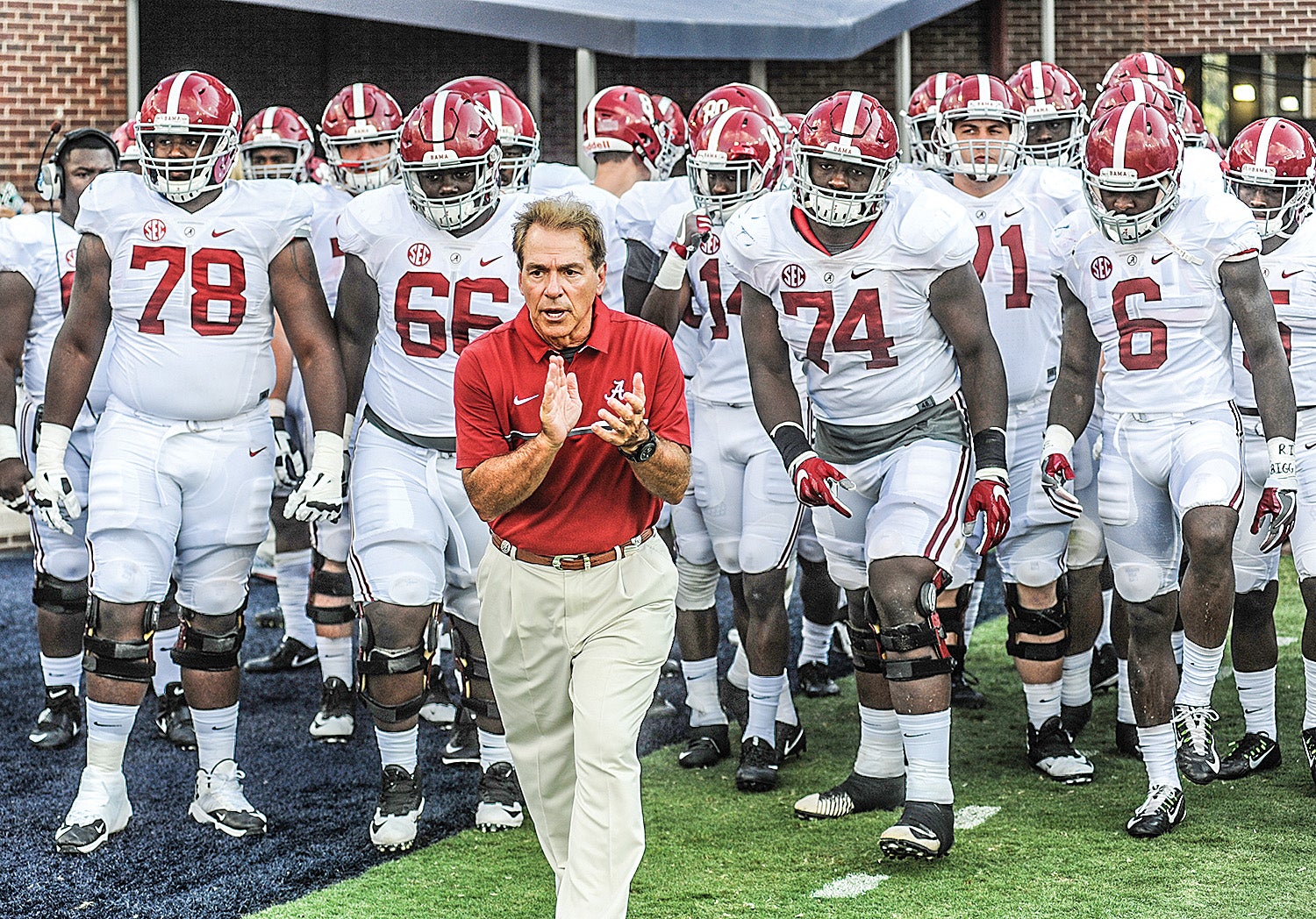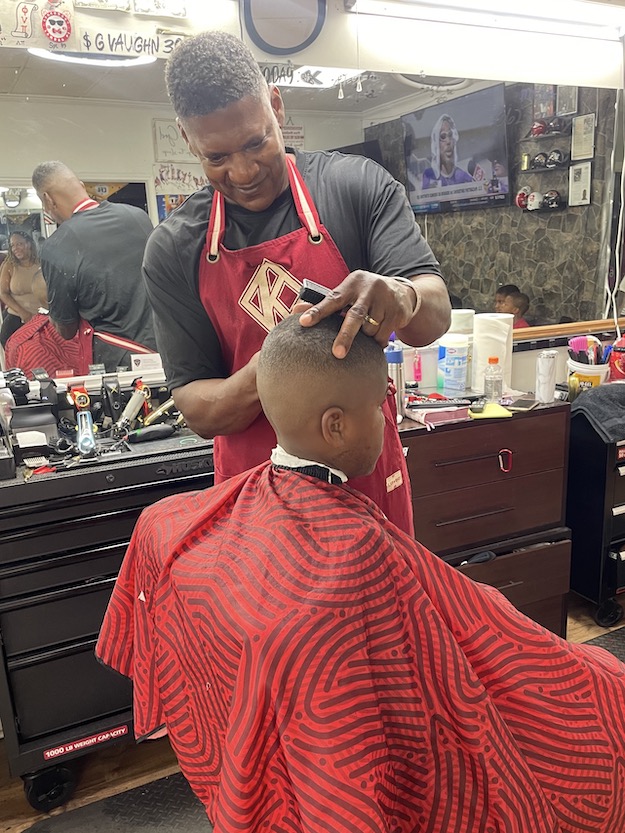COLUMN: Alabama, Nick Saban and lessons Ole Miss can learn from building a program
Published 3:04 pm Thursday, September 26, 2019

- Alabama coach Nick Saban leads his team onto the field against Ole Miss at Vaught-Hemingway Stadium in Oxford on Sept. 17, 2016. (Bruce Newman)
If there’s one thing I believe about sports that never changes, it’s that smart teams will always outperform inept ones over the long haul.
Talent is important, but intelligent building of a team or program matters way more over time.
In just about every way, Alabama is the model for what Ole Miss – and almost every team in FBS football – should be trying to build. But Ole Miss in particular is in a great position to be learning these lessons. In all phases, it starts from the top down.
Trending
Look at the NFL ownership groups. Experience helps, but it’s mostly about intelligence. Dan Snyder, the Washington Redskins owner, took over the team in 1999. Jeffrey Laurie took over the Philadelphia Eagles relatively in the same broad time frame, 1994. While Washington has been run by what seems like a series of nepotism, racial slurs and decades of questionable front office decisions, Philadelphia has been one of the most forward-thinking, innovative franchises in the league, as far as their football decision making is concerned.
Incompetent organizations make incompetent decisions, and when people begin to realize that incompetence, it hurts in recruiting and among the fan base. It’s a self-fulfilling prophecy. Competency and intelligence works in a different sort of self-fulfilling spiral.
In college football, that top-down approach always starts in the athletic department. Guess what? Ole Miss doesn’t even have a full-time athletic director right now. It’s not an ideal place to be, but it is a place that offers the ability to reset the direction of the program, whatever that may be.
A good example of this happened in Oregon around a decade ago. Head coach Mike Bellotti was transitioning to the athletic director role, but had seen something in his offensive coordinator, a guy that had been with him for just two years, that was simply different. That guy was Chip Kelly, one of the most forward-thinking football coaches who has defined the 21st century.
With the modern Alabama dynasty, it was built by simply recognizing situations. When a quarterback is drafted into the NFL, his success is marked, yes, by his talent. But oftentimes, the situation that he gets drafted into defines his next decade more than anything. The same can kind of be true for coaches.
Nick Saban needed just four years at LSU to win their first national championship since 1958. He bounced to the NFL and the Miami Dolphins in 2005, a two-year tenure that ended with a 6-10 season and him bouncing back to college football. But Saban wasn’t all that bad in the NFL. His record stands at 15-17 over two years, and the whole tenure was marred by one decision that wasn’t really in his control. Saban wanted to sign Drew Brees. But the team wouldn’t do it after he failed his physical. Obviously, Brees turned out okay in New Orleans.
Trending
But Alabama recognizing that whole situation is essentially what lead to this modern dynasty. The Tide simply wasn’t that good between Bear Bryant and the arrival of Saban in 2007. They won the SEC just three times between when Bryant retired in 1982 and when Saban did it for the first time in 2009. Now, they’re back to the full-blown powerhouse.
Now, where Ole Miss is going, who knows. There’s so much up in the air right now. Could Keith Carter, Ole Miss’s current interim athletic director, take over the full-time gig? Sure, maybe. Could Matt Luke be back next year as the head coach? Also maybe, but a lot of that is determined by the whoever the athletic director is. And whoever the athletic director is won’t be chosen until the school finds a chancellor. There’s so much instability right now, which is the opposite of what you need to build.
The point here is really that what Ole Miss needs to do is be intelligent, and think differently. So many hires that turn out to be great in retrospect look so different, so unique in the moment. Chip Kelly was a guy that had never been a head coach and had spent just two seasons coordinator at the power five level. He took over Oregon in 2009 and had been an offensive coordinator there since 2007. Before that he had spent 12 years at New Hampshire, never rising above an offensive coordinator.
Of course, it was Laurie and the Eagles that brought Kelly to the NFL ranks. It may not have worked long term at that level, but a lot of Chip Kelly things such as the nutritional training and sports science methods changed how the NFL does things. More recently in the league, Sean McVay was just 30 years old when he became head coach of the Los Angeles Rams, something just prior unconceived.
And here’s the thing: fans aren’t often going to be upset if you try something innovative and new, and it fails. Really, there’s nothing worse than trying something that everyone else does and having it fail. That’s what really gets people up in arms. Most fan bases, any intelligent fan base, would be excited about the prospect of innovation, of just thinking differently.
I think that’s what excited Ole Miss fans about bringing in Mike Macintyre and Rich Rodriguez this offseason. Not that what they do is that innovative anymore, but just that the idea of bringing in two former, and recent, head coaches is different. It’s fun and it’s something not a lot of teams would try. As Ole Miss goes into Alabama this weekend, it’s hard not to think of these programs in wildly different places, as one that came from the same spot. Ole Miss, with a series of intelligent decisions, has a chance to get back there. But it all starts at the top.





